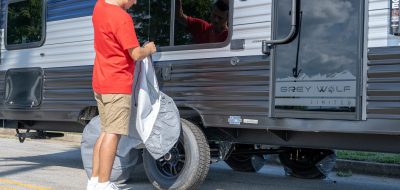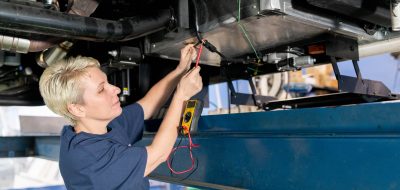Propane fridge fires in RV’s combined with a demand for more fridge space is driving more new RV buyers to purchase the ‘Household Fridge‘ option. Tiffin motorhomes reports the household fridge option to be the most popular. But, what happens when boondocking for extended periods? And, if solar power is to be used, how much is required to run these new refrigerators? James Mannett, a former energy industry executive and current owner of CEA Solar, answers questions from readers about the proper use of Solar Panels for RV use.
Dear James,
A great deal of attention is being paid lately to the propane fridge recalls and fires. A lot of other RV’ers I know are replacing or thinking about replacing their propane fridges with a household version. At first glance, this seems to be a good idea. But, how much power do they use? What electrical changes are necessary? And, what impact would it have on my batteries and my solar system? Signed: Steve Maynard.
Dear Steve:
Great Questions! I have been seeing the same trend and several people have already asked the same questions. So, here are some answers for all readers.
First, let’s look at the numbers. A propane fridge consumes about 0.5 amps at 12VDC. That’s about 6 watts and about 12 amp/hours per 24 hour day. Compare that to a typical new, Energy Star, household fridge that consumes about 1 amp at 120VAC (much more on start up). If powered through an Inverter, that converts to about 13 amps at 12VDC (adjusted for Inverter efficiency losses, etc.) That’s about 156 watts and about 125 amp/hours per day (assuming 40% duty cycle). In short, the household fridge uses 20X more electricity than the propane fridge. This is just about 60% of the stored energy in two RV batteries in one 24 hour period.
Many new RV’s are being built with household fridges. The ones I have seen are wired to a dedicated inverter and a dedicated battery pack. Running the generator re-charges the battery pack while dry camping, the vehicles engine recharges the battery pack while driving, and park power runs the fridge while parked. The owners I have talked to say the system works pretty well. But, they now have 8 batteries on board. 2 for the engine, 2 for the fridge, and 4 for the rest of the house.
So, what do you do if you don’t have a new rig and still want to replace your fridge? If you have an RV without an Inverter, you are best to forget the whole idea. Unless, of course, you want to install an Inverter and additional batteries. Without an Inverter, plan on being plugged into park power continuously or run your generator continuously when Boondocking.
If your RV already has an Inverter and multiple batteries (preferably a minimum of four 6V in a series parallel configuration) you can power your household fridge from your existing inverter. Just don’t forget to turn on the Inverter when you leave the park. In fact, don’t ever shut it off! And, keep an eye on the battery levels. More frequent charging will be necessary.
And finally, what does this do to your solar requirement? Here’s the math: To generate 125 amp/hours per day to satisfy the household fridge demand, you will need about 260 watts of solar power. That’s about 2 average sized panels just to run the fridge. More if you want to power the RV’s other systems at the same time.
In short, if you plan on doing a lot of Boondocking, think a little harder about replacing that propane fridge. If the safety concerns are still first and foremost in your mind, plan on burning more fuel in your generator keeping your batteries charged or installing more solar panels to keep up with the battery drain.
With the cost of fuel rising along with the campground fees, I’ll be doing more Boondocking this year than last. I’m keeping my propane fridge.
Have questions about RV solar power? Would you like James’ RV solar power calculator? You may write James Mannett at [email protected] or visit his blog at http://blog.rvsolarnow.com where you may post your comments or suggestions about this article or others that appear there. RV solar devices can be seen at www.rvsolarnow.com.






Rob
Ok, the “comments” above have not helped me in the least. I am removing my RV refrigerator (norcold) because it’s giving out on me both in electric mode and I have to rig it to have the propane pilot light run contenually for it to work on propane. My norcold has been recalled and from what I can tell it’s been serviced already (I’m the second owner of the RV) and it’s about 21 yrs old now. I’m sick of dealing with it so I bought a compact refrigerator. It’s manufactured by Curtis under the Igloo name, 3.2 cu ft and 420 kwhr/yr which I figured is around a 200 running watts. I was thinking of plugging it into an inverter and run it off battery power. I’m going to purchase a 15 or 20 watt solar battery charger to keep and maintain the batteries power. I then thought it might be easier on the batteries if I got a solar panel to run the refrigerator only. Problem is I’m so confused as to what I actually need in wattage to run the refrig on solar power or anything else for that matter. I tend to do lots of boondocking, watching tv and using my computer and would like to go totally solar but how much in wattage do I need for the solar panel to do this with? To make this more simple to understand, how big of solar panel do I need (and in watts) to run a compact refrigerator, a 32″ flat screen tv, laptop computer etc.?
If anyone can answer this for me and put it in simple language I will fix you dinner 🙂
Thanks
Pingback: How much solar power would I need to run an rv? | Uses of Solar Power
Peter Reilly
What’s a Fridgerator?
Gordon White
Dave a “series parallel set-up for batteries is-2 6 volt batteries wired in series.This gives you 12volts from the batteries .You have 2 sets like this ,than you connect both sets together in parallel to the load”.
Dave Kessler
What’s a “series parallel configuration”?? My physics classes said systems are wired in either series or parallel, not both.
Steve
What exactly is meant by the ‘household fridge’ option? I hope it some kind of actual RV fridge (like a Norcold) and not just some small unit they picked out at their local sears.
RV fridges cost more than regular refrigerators, but they have to operate in generally tougher conditions.
Solar Power Charles
Well description of this new way of promoting solar energy, sounds like a really specific process and I’m not sure people who want to generate their own elecricity thanks to the sun are ready to deal with that.